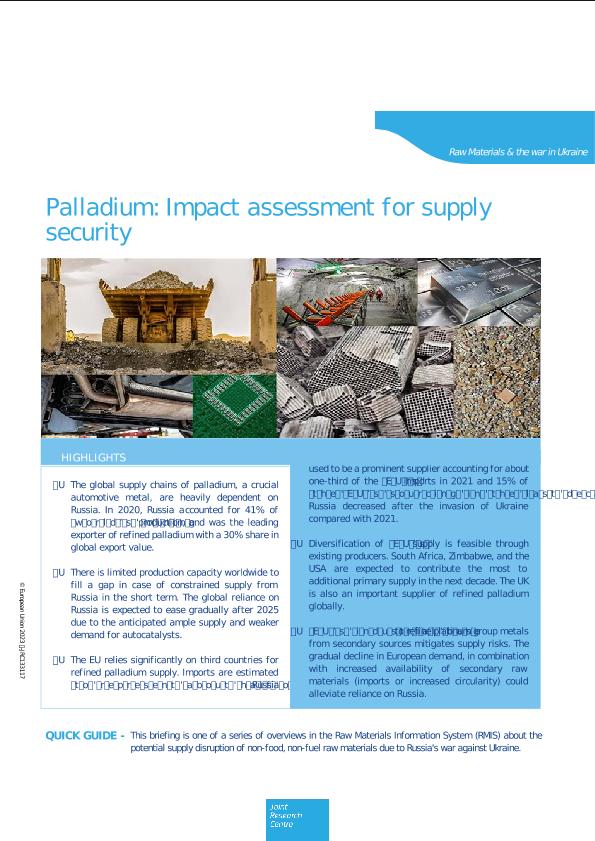Palladium: Impact assessment for supply security

The global supply chains of palladium, a crucial automotive metal, are heavily dependent on Russia. In 2020, Russia accounted for 41% of world’s mining production, and was the leading exporter of refined palladium with a 30% share in global export value.
There is limited production capacity worldwide to fill a gap in case of constrained supply from Russia in the short term. The global reliance on Russia is expected to ease gradually after 2025 due to the anticipated ample supply and weaker demand for autocatalysts.
The EU relies significantly on third countries for refined palladium supply. Imports are estimated to represent about half of the EU’s supply. Russia used to be a prominent supplier accounting for about one-third of the EU’s imports in 2021 and 15% of the EU’s sourcing in the last decade. EU imports from Russia decreased after the invasion of Ukraine compared with 2021.
Diversification of EU’s supply is feasible through existing producers. South Africa, Zimbabwe, and the USA are expected to contribute the most to additional primary supply in the next decade. The UK is also an important supplier of refined palladium globally.
EU’s industrial base to refine platinum group metals from secondary sources mitigates supply risks. The gradual decline in European demand, in combination with increased availability of secondary raw materials (imports or increased circularity) could alleviate reliance on Russia.
Georgitzikis, K., Eynard, U., Bobba, S., Perpetuo Coelho, F., Ingoglia, D., D`elia, E. and Garbossa, E., Palladium: Impact assessment for supply security, European Commission, 2023, JRC133117.
2023-04-20
European Commission
JRC133117
| Language |
Citation |
| ENG | Georgitzikis, K., Eynard, U., Bobba, S., Perpetuo Coelho, F., Ingoglia, D., D`elia, E. and Garbossa, E., Palladium: Impact assessment for supply security, European Commission, 2023, JRC133117. |
JRC133117_01.pdf
(1.45 MB - PDF)


 ; PERPETUO COELHO Fernando; INGOGLIA Davide; D'ELIA Eleonora; GARBOSSA Elisa
; PERPETUO COELHO Fernando; INGOGLIA Davide; D'ELIA Eleonora; GARBOSSA Elisa